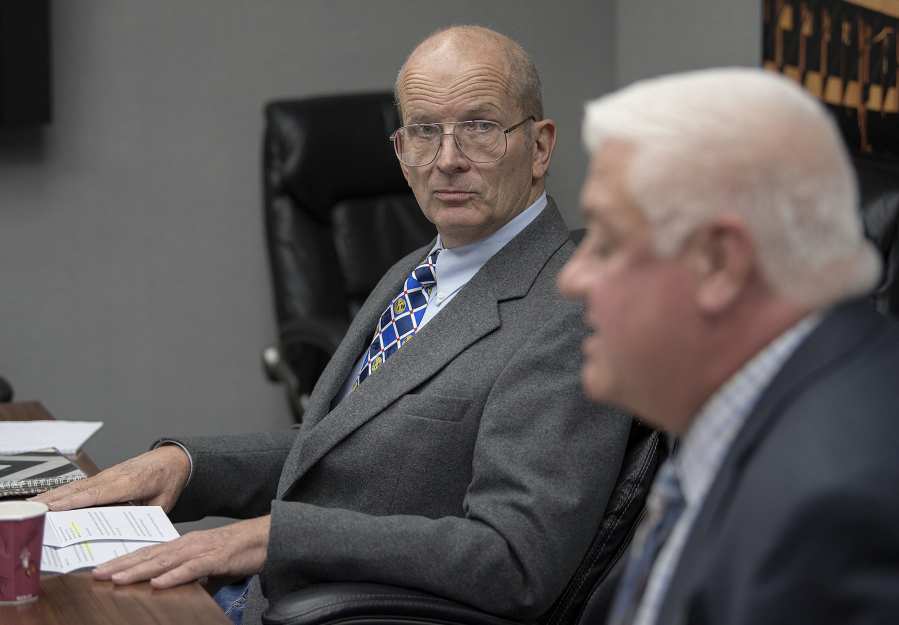Port of Vancouver commissioner candidate Kris Greene said that a misplaced photo on campaign material sent out to voters on behalf of his opponent is part of a “broader, more insidious problem” of “narrowly focused national interest groups funded by out-of-state billionaires” involved in the race.
Earlier this week, the political action committee affiliated with the Seattle-based Washington Conservation Voters mailed out its “2017 Election Guide” for the race. WCV is actively supporting Don Orange in the race, and the four-page guide praised his opposition to a proposed oil terminal at the port while criticizing Greene’s past support for the project and his ties to oil companies. On the cover of the guide is a panoramic picture of the Lions Gate Bridge in Vancouver, British Columbia.
Shannon Murphy, WCV president, called the mix-up an “unfortunate mistake” that she attributed to the rapid pace her group has adopted to keep up with the large amount of oil money funding Greene.
“The Washington Conservation Voters have no real ties to the local community,” reads a statement from Greene’s campaign. “They have such little concern for us that they don’t even know the difference between a picture of Vancouver, WA and Vancouver B.C.”
The race for the Port of Vancouver commissioner District 1 position has become one of the most expensive in the state. Both sides have accused the other of being beholden to funding sources based outside of Vancouver.
A statement from Greene’s campaign underscores that its contributors “have had a presence and contributed in the local Clark County economy for decades.” WCV is funded by its national organization and “mega-donors,” such as Tom Steyer, a prominent California billionaire known for donating to left-leaning candidates and causes, according to the statement.
“Mr. Orange and the Washington Conversation (sic) are simply tools of a national organization pursuing a one-size fits all national agenda that will damage our community’s economy and reputation,” reads the statement.
To date, Greene has received $410,189 in cash contributions, $370,000 of which came from oil companies with a direct interest in the proposed terminal. He also received in-kind donations totalling $162,314 from a political action committee funded by oil and rail interests. Orange has received $116,552 in cash contributions. Late last month, he received $290,000 in in-kind support from WCV’s PAC, which is seeking to counterbalance Greene’s war chest.
According to the most recent filings with the Washington State Public Disclosure Commission, the WCV’s PAC has raised $931,596. The national League of Conservation Voters is the largest contributor to the PAC making donations in August and October that totaled $325,000. Murphy said that the national League of Conservation Voters is a separate legal entity from hers and couldn’t comment on its operations.
The League of Conservation Voters is organized as a nonprofit, which means that its donors are not publicly disclosed. This type of campaign spending is referred to as “dark money” because the source of funding can’t be traced.
According to a 2013 report from the Center For Public Integrity, the League is “fast becoming one of the nation’s strongest ‘dark money’ forces — a realm conservative groups have typically dominated.” According to ProPublica’s nonprofit database, the League of Conservation Voters reported receiving $11.5 million in contributions in 2015.
Alyssa Roberts, spokeswoman for the League, said that the group doesn’t disclose individual donors but does speak on behalf of 2 million members and works with partner organizations in 29 states.
According to the most recent PDC filings, the second-largest source of funding for the PAC is the San Francisco-based Big Organizing Action Fund, which made three donations over the course of September and October that totaled $145,000. Not much is available about the group online, but Zack Malitz, a board member for the group, wrote in an email that Big Organizing is supporting WCV because it is “setting the standard for the kind of scalable, person-to-person organizing at the state level that we believe will be necessary to win big change.” However, Malitz did not respond to a follow-up email asking about who is behind the group or its funding sources.
The third-largest contribution came from Steyer, who donated $125,000 in August.
Murphy said that although WCV gets its funding from outside the state, it’s different than Greene getting money from out-of-state oil companies. She said that WCV and Orange have been transparent in opposing the oil terminal while Greene has obscured his position.
“In addition, (the oil companies) are fighting to increase their profits,” she said. “We are fighting for the health of this community.”
Orange said that he reached out to the WCV because he badly needed help against his better-funded opponent who he said is “smearing my name quite vigorously.” He added that he wouldn’t accept support from the WCV if their values didn’t align.
When asked about the misplaced picture of Vancouver, B.C., on campaign material, Orange laughed and called it a “silly mistake.”
“There are people in the state of Washington who couldn’t find Vancouver on a map,” he said.
But Orange said that he still wants people from Vancouver to decide the race.
“To be quite honest, I’m not comfortable with this whole campaign,” he said. “It’s all gotten completely out of hand and gotten completely negative.”




